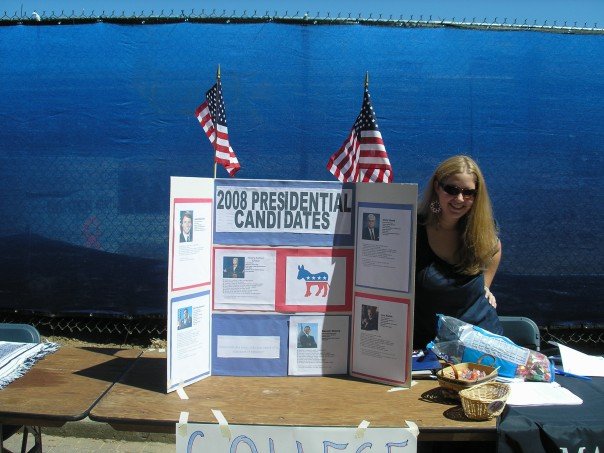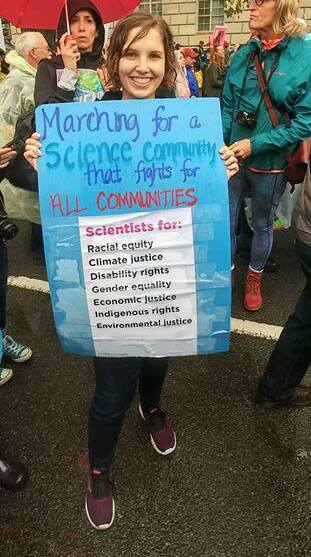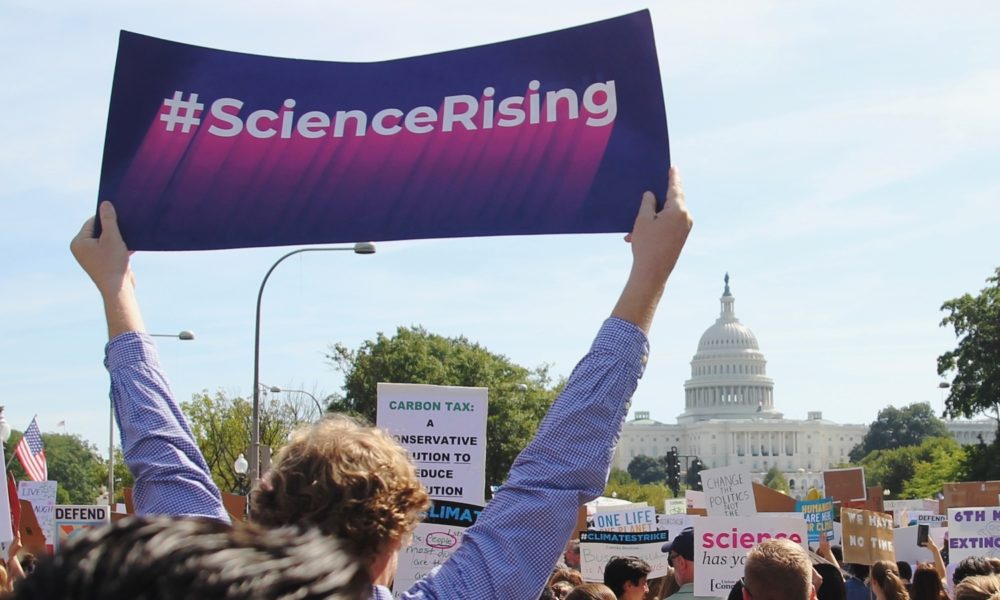What does it mean to help build a movement? For more than seven years, I’ve been working at the Union of Concerned Scientists to help build and engage not just the Science Network, but the broader science advocacy movement. Scientists have power, privilege, and skills that can build community capacity and push for equitable, science-based solutions, but they need training and opportunity to transform their interest into action.
In my role, I help provide resources and connect scientists with opportunities to advocate and organize. But I also want to shift the narrative around how scientists see advocacy—as a responsibility to use their power, privilege, and skills for the public good. To build a movement, scientists must come together and organize with other science advocates and community members to advocate for change. Figuring out your path as a science advocate doesn’t happen overnight. My journey to science advocacy has followed a long and winding path—and it turns out that at each step, science and society intersected.
Global curiosity lights a spark for local action
As a kid, I was obsessed with learning about animals from faraway places. Komodo dragons, red pandas, cassowaries; I was fascinated by them all. I approached my love for animals with a rigor that was probably unusual for most kids. Instead of reading books from the children’s section at the library, I was reading scientific books that detailed different families within the animal kingdom. Clearly, I was a nerd from a very early age.
It wasn’t long before my interest expanded beyond the animals themselves to why so many of them were endangered, and how I could help save them. As I learned about pollution as a contributor to global problems, I got my family to commit to recycling, so we could do our part. I tried to use as little water as possible while brushing my teeth so I could conserve resources. I even ran a lemonade stand from my front yard so I could donate that money to protect endangered species. My desire to change the world was there from an early age, but how I’d make that change would continue to evolve.
From education to politics (via The West Wing)
As I grew up and became aware that individual consumer decisions, while important, weren’t always the most effective or direct path to change, I started following American politics —and then became consumed by it. I shifted my focus to campaigning and national electoral politics as the best path for major policy change on the issues I cared about. I was also heavily influenced by The West Wing, which my American Government teacher used as a proxy instead of actually teaching us about our democracy.
Inspired by that overly-romanticized take on politics, I started college determined to become the next Sam Seaborn. My romance with campaigns was kindled by pep talks from organizers not that much older than myself who taught me the basic tenets of building support for political candidates while sitting in folding chairs in rundown, vacant offices in rundown, increasingly vacant small towns in Ohio near where I grew up. The idea of coming together for a leader who could fix our problems fueled me through campaigning in subzero snowstorms in New Hampshire before the presidential primary and knocking on doors in the oppressive humidity of summer in Ohio.
Working on campaigns made me feel like I was part of something bigger, knowing that every weekend leading up to the election there were dozens or hundreds or thousands of people who were knocking on doors and making phone calls just like I was, as a way of standing up for what we believed in.

Turns out, the real West Wing is not like The West Wing
Still following those West Wing dreams, I moved to DC. My first internship was at a political fundraising firm, which may be the fastest way for anyone to become disenchanted with politics. While I got a jolt of excitement meeting members of Congress in person, the realization that they spent up to half of their free time in offices like ours dialing for dollars left a bitter taste in my mouth. I realized that my vision of electing smart, dedicated individuals so they could talk to scientists about climate change and endangered species conservation and then craft brilliant legislation to address the issues I cared about was something that only happened on a TV show.

In grad school, I had one wise professor who helped relight the spark that brought me to DC in the first place. It was his class on grassroots organizing that reminded me that regular people can also be a powerful force for change; we don’t need to solely rely on elected officials to make change happen. Thinking back to what motivated me from the lemonade stand in my front yard to campaigning for candidates in swing states, and continues to drive me, is the feeling that when people come together, we can make a difference. It feels like my heart racing during the March for Science in DC in 2017, when tens of thousands of people showed up in defense of science, and a buzzing sense of accomplishment when I look at all the leaders who have participated in UCS’s Science Network leadership development programs and gone on to organize others to get involved. Those moments that feel like energy just waiting to be unleashed, where you can almost taste the potential for impact—where you feel part of something much bigger than yourself.
What’s next? Building a movement

My journey has been a winding path through the many ways that science intersects with society, from education to grassroots organizing. Through it all, I have been (and continue to be) driven by the belief that we all have a responsibility to give back to serve the public good. And I now know that I cannot tackle huge issues (like endangered species conservation, climate change, or racial justice) on my own. To achieve transformational change, individuals must step up to help shift the balance of power—and come together to form movements that change the systems and institutions that are holding us back from a more just, healthier, safer future.
I know it won’t be easy. The issues that we face are huge—but that’s why we cannot tackle them alone. We need a strong, inclusive science advocacy movement to meet this moment, and build the future we want to see.
If you’d to join the movement, sign up for the UCS Science Network, and let’s get to work!

